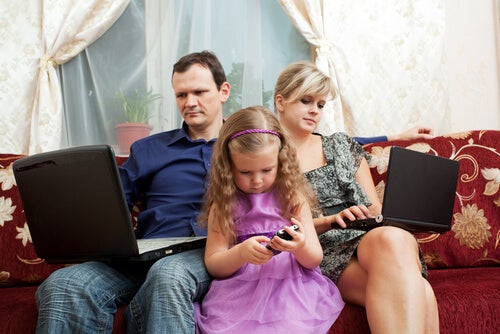Technology and family, mourning of giants in contemporary society. In a society called modern, relationships are clicked, conversations in the eyes, hugs, affection are rare, words are phrases, words are abbreviations, punctuation barely exists, decomposition in education. People think this click helps in what they swear not to have: time, practicality, agility and conformity are part of this career. Children grow up in a rapidly changing world, where time is gold and they live alone now.
The dialogue between parents and children is falling behind, the most common scene in a house is this: in the living room, with the TV on, the parents on the couch playing with their mobile phone and the children in their room playing also with their electronics. devices and often this dialogue that should be in person is digital in the same space.
- Who would say that such a small device.
- An object of measurable value.
- Could be so idolized.
- Hands are busy.
- At lunchtime.
- One hand is for cutlery.
- Just like the other for the mobile phone.
- As a mathematical equation.
- Where the order of the factors changes the sum.
- Unlike the bill.
Technology brings those far away and keeps those nearby
We know that it is an excellent and important tool these days, however, if not used well, it can cause irreparable damage as to the family relationship as a whole and also in school education, without addressing the different areas it can. catch up with.
Family disorganization can be achieved in various areas, whether emotional, social, economic, educational (school), as well as in routine activities, preventing the proper functioning of the family in the day-to-day life with risk of damage in the future.
Expressing emotions, making friends, doing physical exercises, traditional games like playing ball, scoring, flying flags, are replaced by activities in the digital world.
The main area affected in the relationship between parents and children in the digital age is dialogue. Today, most parents spend most of the day away from home; They are consumed by work, they are stressed at home after a day full of professional demands, and when they have time during the day, they communicate with their children through a mobile phone call or the most used WhatsApp.
From an early age, children are presented with a technological device with the justification that thanks to this object parents will have more control over the child because they cannot be close to it.
“Dialogue is dying, many cannot speak of themselves until they are in front of a psychiatrist or psychologist. Parents and children don’t cross paths in their stories, they rarely exchange life experiences. The modern family becomes a group of strangers, all isolated in their own world. Augusto Cury? Current needs.
With multiple tasks, the Internet allows and facilitates the acceleration of information, but human beings have limits, and this becomes a source of stress.
Studies have already concluded that technology addicts have some of the following problems:
Reduced attention, increased obesity, loss of identity and self-esteem, decreased empathy, increased stress and depression.
However, it is not the fault of technology, but of those who use it and how it does it, it is necessary to set limits, determine the frequency of use and also observe what the child does on the Internet. “Boring,” raising and educating is a job, but it’s your duty to say ‘no’, set boundaries, guide, ban and make children understand that good parents aren’t the ones who allow everything.
Frustrer is also part of education; frustration makes it possible to understand that life is not “a bed of roses”, not always everything will work, things do not always go as we wish, the exaggeration of yes omits the reality that surrounds us. Media can be a fantastic world, and once we get into it, it can be hard to get out.
Human beings are increasingly individualistic and self-centered, they want to settle for less effort, they have less ability to put themselves in each other’s place, they cannot perceive or read each other’s emotions, and we always have the reversal of values, where having is more important than being.
Technologically dependent young people care about the approval of society, the group in which they live, because in this world in which they live, they think they are not alone. As this is a recent fact, we still do not know what future adults will look at the effects of technology on them. So we can’t wait seated, we have to act before this future society is overrun by emotional illness.

